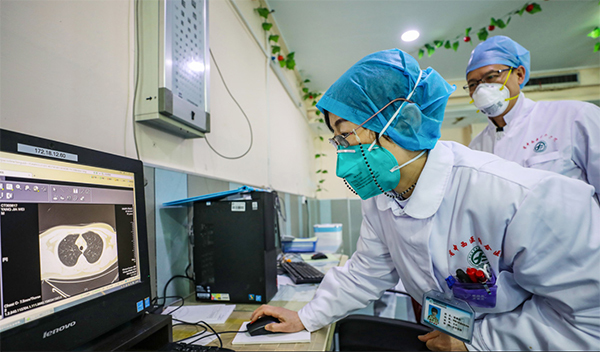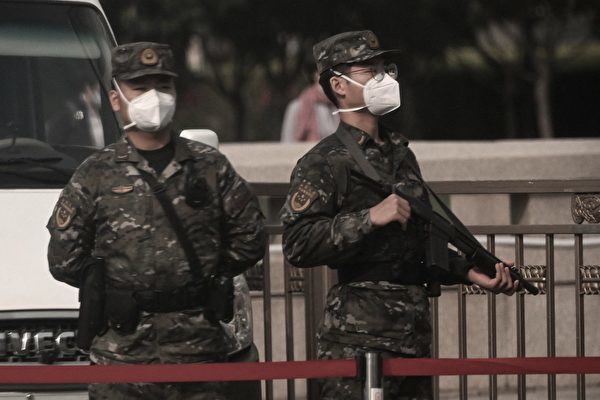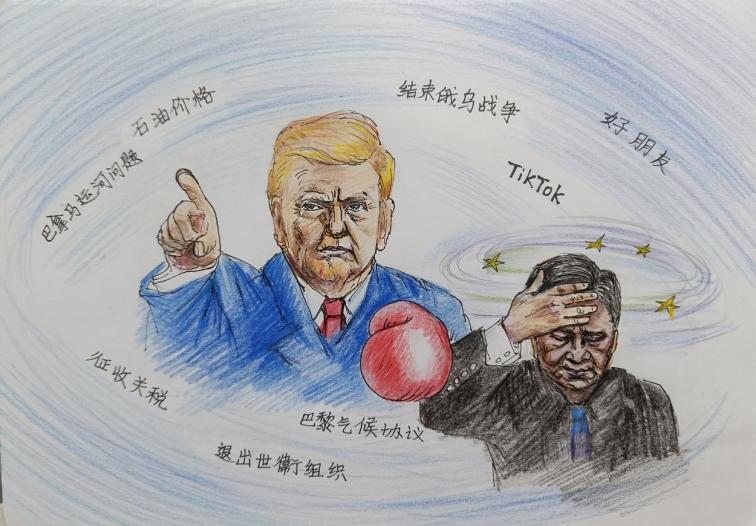Image: A hospital ward. (Getty Images)
[People News] Due to economic recession and the impact of COVID-19 leading to insufficient healthcare resources, China exclusively used domestically produced generic drugs in last year's drug procurement, forcing multinational pharmaceutical companies’ original imported drugs off the national health insurance list. Previously, doctors had repeatedly exposed the efficacy issues of domestic generic drugs, and a retired professor from Tsinghua University also criticized the poor-quality medications for harming patients. However, the CCP’s National Healthcare Security Administration and drug regulatory authorities continue to firmly support domestic generics. Industry insiders suggest that the government's outright denial in the face of professional and consumer concerns actually serves as indirect confirmation of the problem.
According to Radio Free Asia (RFA), CCP state media Xinhua News Agency reported on Sunday (9th) that, in response to concerns raised by doctors during the Shanghai municipal government meetings about potential quality risks in drug procurement, relevant government departments have sent personnel to Shanghai to investigate the situation. Officials from the National Healthcare Security Administration and drug regulatory agencies defended domestic generics, attempting to refute previous doctor reports of issues such as "blood pressure not decreasing, anesthesia not working, and laxatives not taking effect."
Drug Administration: Evaluation Standards Are Strict and Aligned with International Requirements
Regarding the efficacy concerns of domestic generic blood pressure medications, state media quoted information from the National Healthcare Security Administration, citing clinical research conducted at Ruijin Hospital, affiliated with Shanghai Jiao Tong University School of Medicine. The study compared a domestically produced generic Amlodipine Besylate with the original patented version, claiming that both achieved a reduction in blood pressure levels in primary hypertension patients.
As for the previous claims that domestic anesthesia "fails to work," the report referenced a case study from Ruijin Hospital regarding the ninth batch of purchased anesthesia drug Propofol Emulsion Injection for general anesthesia. While no statistical data on the overall anesthesia process was provided, the study did note that during the induction phase of anesthesia, the original drug required an average dosage of 146 mg, while the generic version required 157 mg. Authorities insisted that there was no evidence of "anesthesia not working"—only a slight increase in the required dosage during the induction phase.
Regarding issues with domestic laxatives, a representative from the National Healthcare Security Administration gave an even more surprising response, stating that the Polyethylene Glycol Electrolyte Powder, used for intestinal cleansing, was a newly included drug in the 10th procurement batch. Since the final selection results were only announced on December 30, 2024, the drug is still in the pre-implementation stage and has not yet been widely used.
The National Medical Products Administration also emphasized that its evaluation standards are strict and internationally aligned, asserting that all generic drugs are benchmarked against reference formulations to ensure equivalence. However, they did not provide specific data to support these claims.
The CCP also stated that the removal of imported drugs from the procurement list does not mean a complete withdrawal from the Chinese market, implying that medical institutions can still independently choose these drugs. However, officials did not explicitly clarify that patients would have to pay for them out of pocket.
80-Year-Old Journalist Gao Yu Forced to Take Domestic Blood Pressure Medication, Struggles to Control Blood Pressure
Veteran Beijing journalist Gao Yu has been taking four essential medications for hypertension, angina, and other conditions. She previously relied entirely on imported or joint-venture drugs. However, over the past two months, imported drugs have been removed from public hospitals, leaving her with only a small stockpile of medications for angina and high cholesterol. For hypertension, she has been forced to switch to domestic drugs, but even when taking the same dosage as before, her blood pressure remains uncontrolled. She has since increased her dosage, yet her blood pressure remains difficult to stabilize.
Gao Yu stated: "There have been no imported drugs for two months. I need to take four essential medications for my chronic conditions. My blood pressure medication was switched, and at first, I felt very unwell. My blood pressure shot up to over 190 systolic and over 110 diastolic. Now, I take two tablets of the newly assigned drug 'Topine' daily—one and a half times my previous dosage—but it still doesn’t lower my blood pressure. My readings are still above 150 most days."
Gao Yu believes that patients are the most qualified to judge the efficacy of generic drugs versus original medications, yet the Chinese Communist Party (CCP) strongly endorses generics without providing convincing data. Many suspect that the authorities are falsifying information.
"How can the National Healthcare Security Administration claim with certainty that the quality of the procured drugs is guaranteed? Their statements are incredibly arbitrary. Personally, I believe this blood pressure medication is far inferior in quality. Many people online are saying that they are using data from the original manufacturer’s drugs and passing it off as their own. But we have no way to verify this—we can only 'test' these drugs with our own bodies. If this continues, I will have to buy the original drug at my own expense."
Patients: The Difference Between Domestic Generics and Foreign Original Drugs Is Obvious
A Beijing resident, Mr. Li, also shared his experience with Radio Free Asia (RFA), stating that ordinary citizens no longer trust official claims because the difference in efficacy between domestic generics and foreign originals is obvious.
"The difference is clear in daily use. Those domestically procured drugs just don’t work as well as the original ones. The CCP officials and 'experts' fooled people during the pandemic—do they think the public is stupid? We’ve all had at least nine years of compulsory education. Who still believes them?"
Industry Experts: Government Denials Only Confirm the Inferior Efficacy of Domestic Drugs
A medical industry professional, speaking anonymously for safety reasons, told RFA that the CCP government is prioritizing cost-cutting over drug efficacy. He suggested that the government’s denial actually serves as indirect confirmation of the problem.
"Recently, the government forced domestically produced drugs into the bulk procurement and reimbursement system, while effective imported drugs were excluded. The result? The drugs covered by insurance are ineffective. When procuring medicines, cost should not be the only consideration—treatment effectiveness matters, too. But this is China. Whenever the government rushes to 'debunk' something, it often just confirms that the issue is real."
As China struggles with economic downturns and post-pandemic medical resource shortages, the CCP has started cutting healthcare spending. In early January, Chinese media revealed that in the latest national centralized drug procurement process, domestic generic manufacturers dominated the bids by offering rock-bottom prices, while no original drug manufacturers secured a bid. Shortly after, members of the medical community began criticizing the poor clinical efficacy of the procured drugs, coining the phrase: "Anesthesia doesn’t put you to sleep, blood pressure doesn’t drop, and laxatives don’t work."
Doctors Previously Exposed the Problems with Domestic Generics
At the Shanghai Two Sessions in January, 20 members of the Shanghai Municipal People’s Political Consultative Conference (CPPCC) from the medical field submitted a proposal titled "How to Ensure Effective Medications Under the Current Drug Procurement System." The proposal directly questioned the low and unstable efficacy of some procured drugs, highlighted how doctors have lost the ability to choose appropriate treatments, and called on the government to retain access to higher-quality original drugs.
One of the proposal’s co-sponsors, Zheng Minhua, a Shanghai CPPCC Standing Committee member and chief surgeon at Ruijin Hospital, was reportedly summoned for questioning by authorities at the end of January. The hospital also issued an internal notice criticizing him, and he was stripped of his entire annual performance bonus—a classic example of the CCP’s approach: "Don’t solve the problem, just punish those who expose it."
Similarly, Lu Changlin, a Beijing CPPCC member and chief cardiologist at Beijing Chaoyang Hospital, submitted a similar proposal at the Beijing Two Sessions. He pointed out the poor efficacy of procured drugs, called for stricter post-market surveillance, and opposed forcing doctors and patients to use subpar medications.
Tsinghua University retired professor Sun Liping published an article titled "This Is a Huge Issue—Do Not Take It Lightly." He warned that despite the high level of medical advancements today, political and financial motives are forcing people to use ineffective or even harmful drugs and medical devices. "This is simply unacceptable. If we cross this line, it will trigger a medical trust crisis."











News magazine bootstrap themes!
I like this themes, fast loading and look profesional
Thank you Carlos!
You're welcome!
Please support me with give positive rating!
Yes Sure!